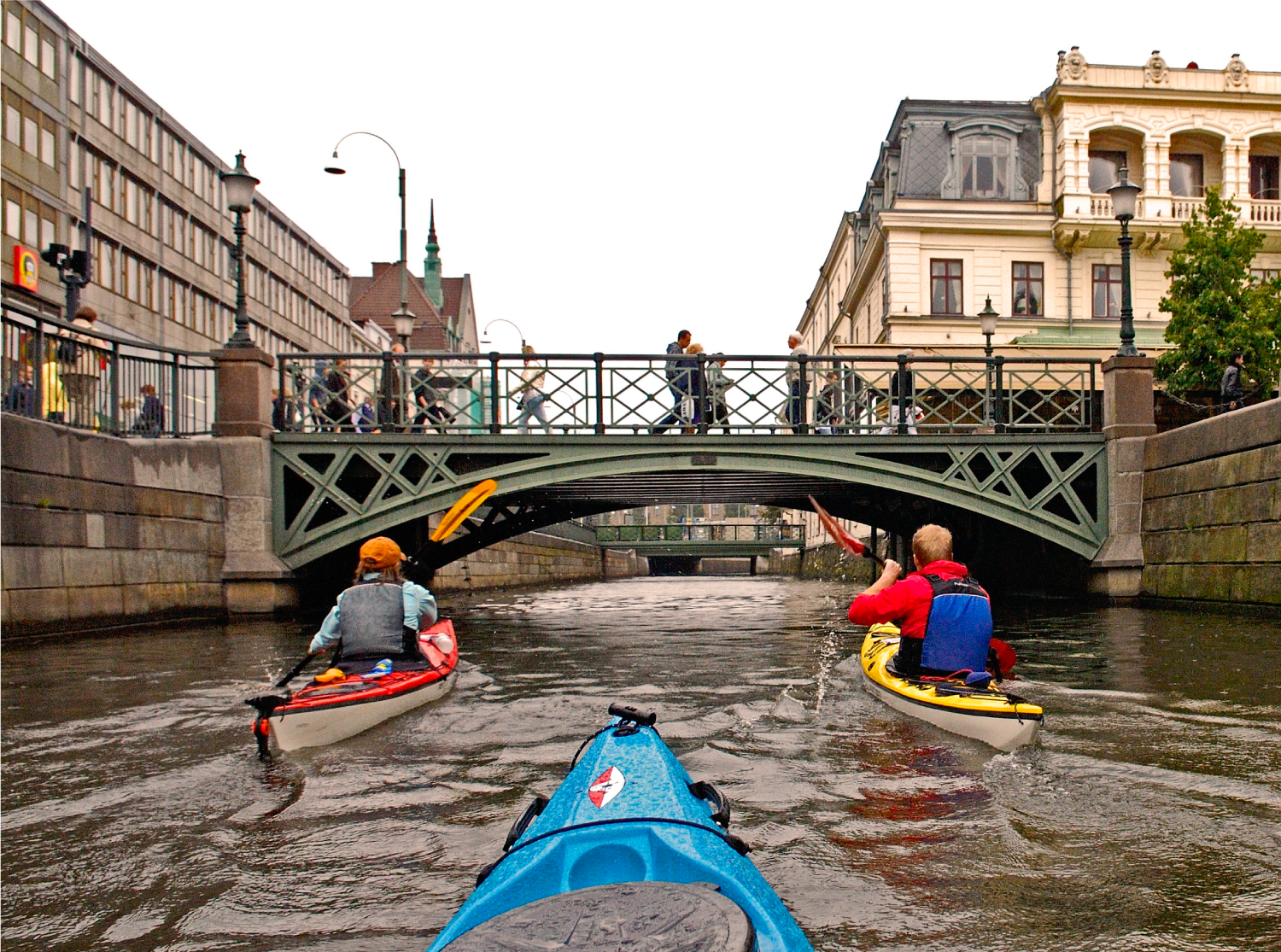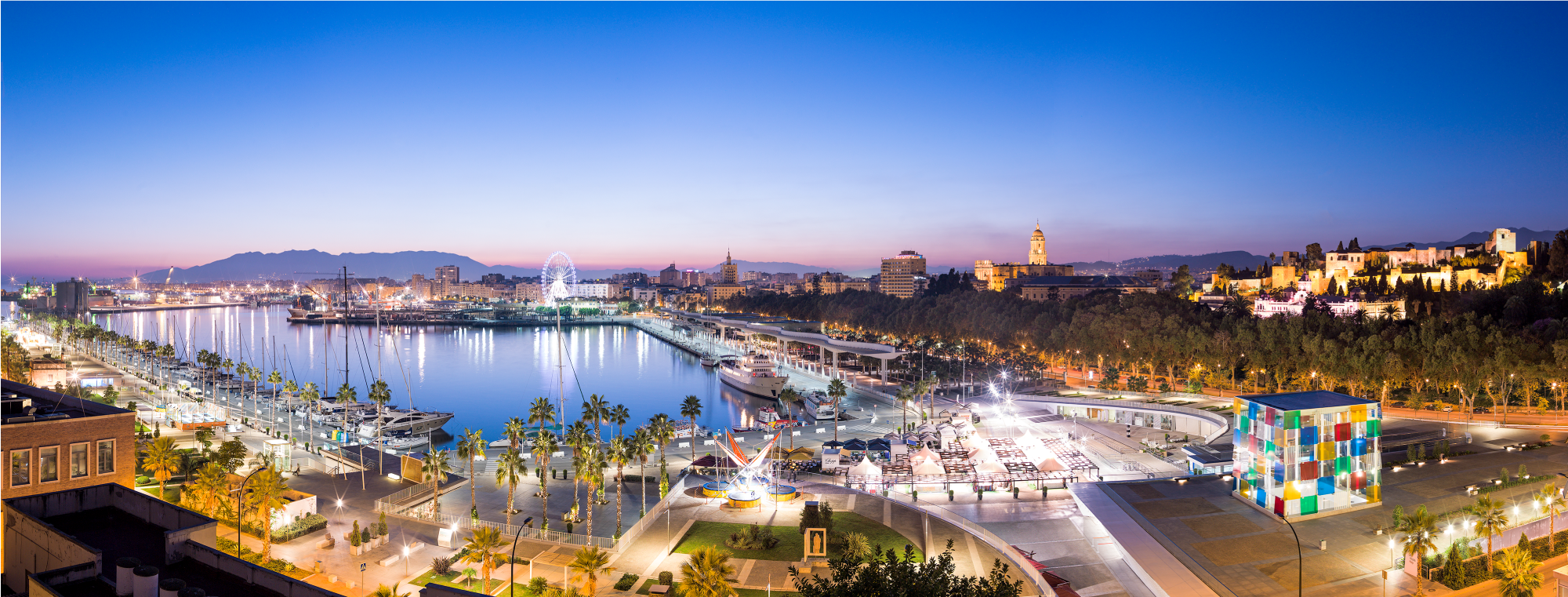Both cities see their smart city development as a long-term work in progress.
With a few taps on a smart device, travelers can find all the information they need to book a trip to Gothenburg, Sweden. Once there, they can take advantage of the abundant 4G coverage, purchase public transport tickets via app, map a bike route from the palm of their hand, and chat with a tourism representative online if they have any other questions about visiting this digitally focused city.
Meanwhile, travelers who have visited Málaga, Spain, in the past may not recognize the rejuvenated city. Long known for its beaches, Málaga’s art-infused cultural character is now front and center at its signature festivals and 37 museums — up from four museums only 20 years ago. And the city’s special attention on accessibility ensures visitors with impairments have no problems enjoying all it has to offer.
More than 3,300 kilometers separate the two cities, but one key feature unites them: The European Commission recently named them the winners of the 2020 European Capital of Smart Tourism competition. The selection jury chose Gothenburg and Málaga from a pool of 35 cities from 17 European Union member states due to their sustainability, accessibility, digitalisation, and cultural heritage and creativity initiatives.
It’s not just their achievements in these areas that helped Gothenburg and Málaga stand out, however. As forward-thinking tourism destinations, both serve as role models for other cities supporting the growing travel and tourism industry.
Gothenburg, Sweden: Sustainability Focused, Digitally Enhanced
“For more than 10 years, we’ve been working actively on implementing or integrating sustainability into our industry and our stakeholders, so vying to be a European Capital of Smart Tourism was a natural development of our strategy,” said Katarina Torstensson, destination development and sustainability strategist for Göteborg & Co, the city’s destination management organization (DMO) and municipal company working in close partnership with the tourism industry. Noted as the world’s most sustainable destination by the Global Destination Sustainability Index in 2016, 2017, 2018, and 2019, sustainable initiatives underpin every aspect of Gothenburg’s ethos.

City representatives have always had an eye on the future, developing a community that supports its residents while making it accessible to visitors. The city deliberately addresses environmental issues within the community while focusing on social and economic spheres of sustainability as well. A highly holistic destination, Gothenburg uses digital innovation throughout all aspects of its infrastructure, with excellent connectivity in the city, apps that ease navigation, and other digital services that make it simple to fully enjoy what the city has to offer. Gothenburg stood out for its digital solutions that help improve experiences for both citizens and tourists, according to the Secretariat of the European Capital of Smart Tourism.
Yet, even as the city focuses more on a digital future, planners carefully consider what this means on a personal level. “We think about how to adapt and make something out of these possibilities in digitalization without losing the human touch and the meeting between people,” Torstensson said.
Málaga, Spain: From Sun and Sea to Accessible Cultural Hub
Arguably, Málaga has been a popular travel destination for a long time. Managing its tourism success in a way that positively impacts the city, its people, and the environment is one of the key challenges such a destination faces. Representatives committed to turning Málaga into a smart city nearly a decade ago, and the changes are apparent. The jury acknowledged Málaga’s transformation from a traditional sun-and-sea tourism spot into a modern and innovative tourism destination, according to the Secretariat of the European Capital of Smart Tourism.
Now known as a city of museums, visitors to Málaga today are likely to visit one of these institutions celebrating the city’s rich history and heritage. In fact, there are more than 80 museum visits for every 100 overnight stays in the city. And with accessibility measures in place across the city, all visitors can appreciate Málaga’s attractions.

In addition to emphasizing its cultural heritage, measures emphasizing energy efficiency, sustainable mobility, urban connectivity, and technological entrepreneurship underpin its status as a leading smart city. “Málaga is now an intelligent, enterprising city, surrounded by an innovative ecosystem called Málaga Valley, where rich historical heritage and technology meet to improve everyone’s quality of life,” said Rosa Sánchez Jiménez, councillor for tourism, promotion of the city, and investment collection with the Málaga City Council. Málaga Valley, which has been referred to as the Spanish Silicon Valley, is a hub for business development and includes the Andalucian Technological Park, the University of Málaga, several smart city pilot projects, research and development for high-speed rail lines, and a structure that supports entrepreneurs.
Success Factor: A Commitment to Sustainability First
To become smart tourism destinations, both Gothenburg and Málaga focused on all aspects of becoming sustainable cities first. This multifaceted concept of sustainability requires consideration of accessibility, infrastructure, care for the environment, and quality of life for residents. Smart tourism development is folded into the fabric of sustainable city planning and development. A sustainable destination, Sánchez Jiménez said, “creates wealth in the present but takes care of its resources so that it can continue to create it in the future. That is the only way to work today, because if we abandon sustainability, we cannot talk about the future.”
“A sustainable destination creates wealth in the present but takes care of its resources so that it can continue to create it in the future. That is the only way to work today, because if we abandon sustainability, we cannot talk about the future.”
Gothenburg’s commitment to ecological sustainability, in particular, is well documented. For example, 65% of the city’s public transportation runs on renewable energy, all meat served in the municipality must be organically farmed, and nearly all of the city’s hotels hold environmental diplomas. Its residents are crucial to this success, and their needs are met with abundant and accessible social events and economic opportunities all year long. City representatives recognize environment, social, and economic sustainability are essential to Gothenburg's success as a sustainable city and address all three together.
The long game of sustainable development is at the heart of both cities. It existed in the years prior to the European Commission’s recognition, and it will continue to be the cornerstone upon which both cities are built in the years ahead. Torstensson said Gothenburg representatives will use this year to launch several test projects related to sustainable and smart development. “We believe at the end of 2020 we will have this short list or project portfolio of things to further develop and explore, so we see this as a first year of a long-term commitment.”
Success Factor: Community Involvement
Being a sustainable tourism destination starts with consideration of and buy-in from the local community. Happy, healthy residents benefit from smart tourism and the economic stimulus provided by the industry. In the EU, tourism represents approximately 10% of the gross domestic product, and more than 13 million people are employed by the sector. In Gothenburg and Málaga, residents working in the tourism industry and beyond are a frontline factor in their success. “There is no distinction between what is offered to visitors and what is offered to residents,” Sánchez Jiménez said. “On the contrary, our strategic idea is that if Málaga is an attractive city for its own citizens, it will also be an attractive city for tourists to come and for those who want to work and invest here to come.”
When representatives measure the city’s image and reputation, Torstensson said it's common for people to note Gothenburg’s friendly residents. “They are, of course, an important part of our destination,” she said. For example, local events are created with residents in mind, and they not only attend but also help organize and volunteer at them.
Success Factor: Cooperation Between Public and Private Sectors
Tourism doesn’t happen in a vacuum, and representatives from both Gothenburg and Málaga acknowledge the importance of collaboration between stakeholders in the public and private sectors in their advancement as smart cities.
“We have collaboration in our DNA,” Torstensson said. “We always engage the industry and the city when we do things.” In Gothenburg, stakeholders across all sectors recognize the value in tourism, and regardless of political leanings, people are united in supporting initiatives that encourage smart tourism development. This allows the city to grow in this area in a consistent and stable manner. According to the Secretariat of the European Capital of Smart Tourism, the jury was strongly impressed with how the city works together with a wide variety of stakeholders and sectors to implement a truly integrated approach to smart tourism.
Breaking down silos is apparent in Málaga as well. “Málaga’s tourism strategy forms a broader strategy, a city strategy,” Sánchez Jiménez said. For more than 12 years, members of the Málaga Tourism Forum, which include stakeholders in the tourism industry and all related institutions, have worked together to consider tourism initiatives from multiple perspectives.
Looking Ahead
Representatives for Gothenburg and Málaga note that being recognized as European Capitals of Smart Tourism isn’t an end goal but an opportunity to amplify the work they’ve started to an even greater degree. “We really see this year as a change agent for our industry,” Torstensson said. “As a DMO, we would like to show that we’re enablers of development and change. We see this year as a catalyst in a way.” As a member of the National Network of Intelligent Tourist Destinations, Málaga representatives will also use this opportunity to actively promote smart tourism development, particularly throughout Spain.
But, even as both cities plan to use the upcoming year to influence and inspire smart development in other destinations, both are eager to learn from others as well. Representatives from Gothenburg, Málaga, and several other smart cities have plans to gather throughout 2020 to share experiences and exchange ideas. “We have to both share and learn,” Torstensson said. “That’s a very important part of the upcoming year.”
